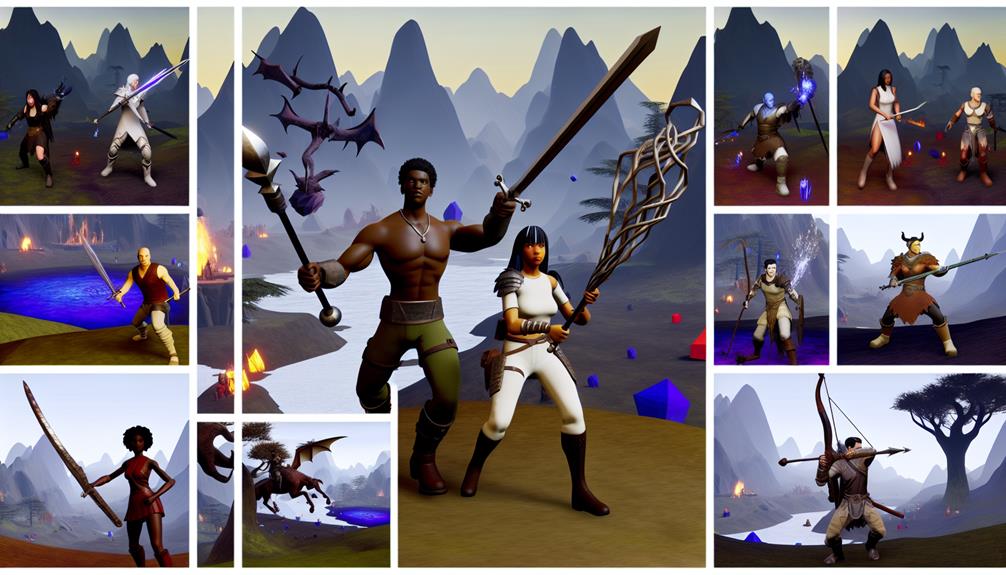In the vast landscape of online gaming, MMORPGs stand out as a genre that continues to captivate players worldwide. Understanding the basics of MMORPGs is essential for both newcomers and seasoned adventurers alike.
From their humble beginnings to the sophisticated virtual worlds of today, these games offer a unique blend of elements that keep players engaged for hours on end. Core mechanics, character progression, social interaction, and endgame content are just a few facets that shape the MMORPG experience.
But what truly defines the essence of MMORPGs and sets them apart from other genres?
Key Takeaways
- MMORPGs offer diverse player interactions and activities.
- Character progression includes leveling up and equipment upgrades.
- Socialization through guilds, parties, and community events.
- Endgame content presents challenging group battles and rare rewards.
Origin and Evolution
The genesis and progression of MMORPGs trace back to the early days of online gaming, marking a transformative journey in the realm of virtual worlds. MMORPGs, or Massively Multiplayer Online Role-Playing Games, flourished due to the vibrant player community that embraced these immersive digital universes. These games allowed players to connect, collaborate, and compete on a scale never seen before, fostering friendships and rivalries alike.
Central to the MMORPG experience is the virtual economy, where players engage in buying, selling, and trading virtual goods and services. This virtual economy mirrors real-world market dynamics, with supply and demand shaping prices, and player-driven markets evolving organically. The virtual economy not only adds depth to gameplay but also creates opportunities for players to specialize in trading, crafting, or other economic activities within the game world.
The player community and virtual economy are fundamental pillars that have defined MMORPGs since their inception, laying the groundwork for the rich and diverse virtual landscapes that players explore and inhabit today.
Core Mechanics
Foundational to the immersive world of MMORPGs are the core mechanics that govern player interactions, character progression, and gameplay dynamics. These gameplay elements are designed to provide players with a rich and engaging experience that encourages socialization and collaboration.
In MMORPGs, player interaction is a key component that shapes the virtual world. Players can form parties or guilds to tackle challenging quests together, engage in player-versus-player combat, or trade goods and services.
The core mechanics of MMORPGs also include features such as questing, crafting, and exploration. Questing involves completing tasks assigned by non-player characters to earn rewards and advance the storyline. Crafting allows players to create items using resources gathered from the game world, which can then be used or sold to other players. Exploration involves discovering new areas, uncovering hidden treasures, and encountering various creatures.
Character Progression
In the realm of MMORPGs, character progression serves as the crucial mechanism through which players evolve and enhance their virtual personas within the expansive digital landscapes. Advancing through levels and unlocking new abilities are fundamental aspects of character progression in MMORPGs.
Here are some key elements related to character progression:
- Leveling Up: Progressing through levels by completing quests, defeating enemies, or engaging in various activities within the game world.
- Skill Trees: Offering players the freedom to customize their character's abilities by investing points into different skill trees that cater to various playstyles.
- Experience Points: Accumulating experience points through gameplay to level up and access higher-level content.
- Gear Progression: Obtaining better equipment through quests, crafting, or looting to enhance character performance.
- Specializations: Allowing players to specialize in certain roles or abilities as they progress, shaping their character's unique identity within the game world.
Character progression is a core element that keeps players engaged and invested in their virtual adventures.
Social Interaction
Facilitating player connections and fostering community bonds, social interaction in MMORPGs plays a pivotal role in enriching the virtual experience. In MMORPGs, players have the opportunity to form online friendships and become part of vibrant virtual communities. These connections often extend beyond the game, leading to lasting relationships and a sense of belonging.
To illustrate the significance of social interaction in MMORPGs, let's look at the following table showcasing some common activities that players engage in to interact with each other:
| Social Interaction Activities | Description | Benefits |
|---|---|---|
| Joining Guilds | Team up with others for quests | Collaboration and support |
| Participating in Raids | Challenging group battles | Strategic coordination and teamwork |
| Chatting in Forums | Discussions and sharing tips | Knowledge exchange and community building |
| Attending In-Game Events | Festivals, competitions | Fun, socializing, and rewards |
| Forming Alliances | Uniting with other groups | Strength in numbers and shared resources |
In MMORPGs, these activities not only enhance gameplay but also nurture relationships and create a sense of camaraderie within the virtual world.
Endgame Content
Exploring the pinnacle of challenges and rewards within MMORPGs, Endgame Content serves as the ultimate test of player skills and dedication in the virtual realm. This phase of gameplay is where the most experienced adventurers converge to tackle the toughest challenges and reap the greatest rewards. In the realm of Endgame Content, players strategize to achieve their ultimate endgame goals, whether it's obtaining powerful gear, reaching the highest levels, or conquering formidable foes in epic battles.
- Raid Challenges: Players band together to face complex and demanding encounters that require teamwork, coordination, and skill to overcome.
- Loot Rewards: Successful completion of these challenges often yields rare and powerful loot that can significantly enhance a player's character.
- Player Strategies: Developing effective strategies and tactics is crucial to navigate the intricate mechanics of endgame content.
- Endgame Goals: Players set personal goals such as completing all endgame content, achieving top rankings, or obtaining specific items.
- Community Engagement: Endgame content encourages social interaction, fostering camaraderie and competition among players striving for mastery.
Frequently Asked Questions
How Do MMORPGs Handle In-Game Currency and Economies?
In MMORPGs, in-game currency and economies are managed through intricate trading systems and auction houses. Developers employ various measures to combat inflation by introducing gold sinks, ensuring a balanced economy that enhances gameplay dynamics and player interactions.
What Are Some Common Strategies for Successful Group Gameplay in Mmorpgs?
Effective group gameplay in MMORPGs hinges on clear communication, coordinated teamwork, and well-defined roles. Strategies for success involve establishing goals, assigning responsibilities, and adapting to challenges as a cohesive unit to achieve objectives efficiently.
Are There Any Common Pitfalls or Mistakes That New Players Should Avoid in Mmorpgs?
In MMORPGs, new players should avoid burnout by pacing themselves and balancing gameplay with breaks. Building strong relationships within the community enhances the gaming experience, fosters teamwork, and provides support during challenging quests.
How Do MMORPGs Typically Handle Player Vs Player (Pvp) Content?
MMORPGs typically handle player vs player (PvP) content by offering various modes such as faction warfare, open world dynamics, and structured arenas. PvP balance is crucial for fair gameplay, with competitive rewards incentivizing players to engage in challenging encounters.
What Are Some Examples of Popular MMORPGs That Have Unique Features or Gameplay Elements?
When examining popular MMORPGs with unique features, one can delve into titles like "World of Warcraft" known for its expansive quests and open-world exploration, or "Final Fantasy XIV" celebrated for its intricate character customization and rich social interactions.
Conclusion
In conclusion, the basics of MMORPGs encompass a rich history of evolution, core mechanics, character progression, social interaction, and endgame content.
As the saying goes, 'patience is a virtue,' players must navigate through various challenges and quests to achieve success in the virtual world.
Understanding these fundamental aspects is essential for those seeking to immerse themselves in the vast and dynamic realm of MMORPGs.

